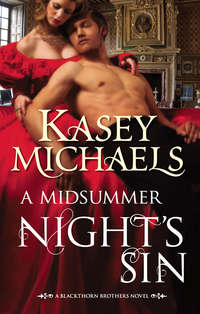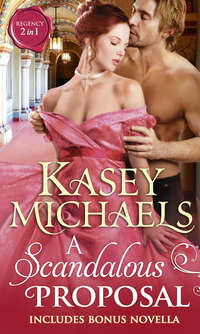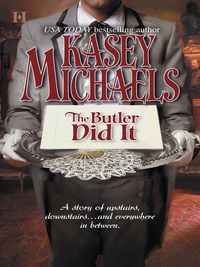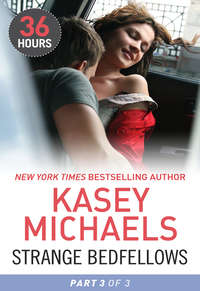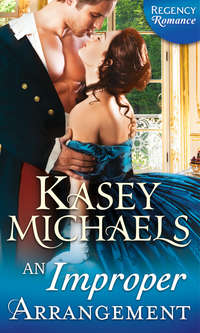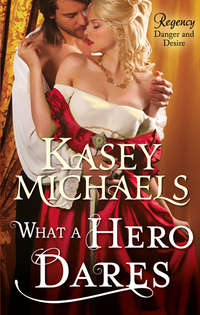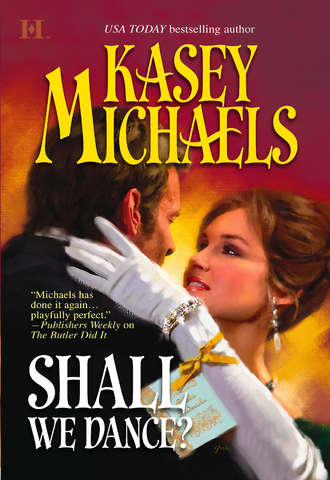
Полная версия
Shall We Dance?
“Never mind that. Rolin is a bastard. A pretty bastard, but a bastard all the same. The man lives to seduce innocents. You can’t think to use him.”
“Can’t we? He’s perfect, Nevvie. An outcast from Society for the nonce, hiding out on his estate in Surrey. The princess adores outcasts, feels an affinity for them, I believe. But, as I said, he would be our second choice.”
“You know, Uncle, if I have a failing in life it has always been in underestimating you.”
“Only that, Nevvie? If you applied to me, I could provide you with a detailed list of your shortcomings. Now hurry along, dear boy. Miss Fredericks awaits. Oh, one thing more. Report here tomorrow and I’ll explain.”
“I could be on the continent by tomorrow,” Perry suggested, his hand on the door latch.
“True, but you won’t be. I do so enjoy honorable gentlemen. And you are that, Perry, for all that you’re also an idiot. Tomorrow at two, agreed?”
Perry inclined his head slightly, then departed, carrying off the broadsheet he’d grabbed up, hoping the artist had at least gotten the slim female figure right.
“I COULD BE SKINNY and bony like you, you know, instead of more fashionably plump,” Her Royal Majesty said as Amelia Fredericks entered the small salon overlooking the Thames. “If I so wished.”
“Yes, ma’am,” Amelia said, smiling at the queen as she placed a fresh dish of boiled sweets on the table beside the woman, then retook her seat in front of the window. “A lovely day, isn’t it, although the sun doesn’t seem quite as bright here as it did in Jerusalem.”
“Nothing seems quite as bright here,” the queen said, her scowl warning Amelia that another fit of hysteria was knocking on the door of the woman’s consciousness, eager for admittance. She had, just minutes earlier, climbed up into the boughs of the queen’s injured pride and dragged her down with the promise of the boiled sweets. “Rainy, dreary, damp. And that pile they call a palace? Blow your skirts up over your head, just walking down the hallways on a windy day. I hate it. I hate it all. I hate them all. And I’m old, and I’m ugly, and I’m fat. I hate me!”
The dish of boiled sweets landed on the fireplace grate and smashed into several pieces, the candies skittering everywhere.
Amelia suppressed a sigh. “I’ll ring for someone.”
“No! Leave it.” The queen blinked rapidly, her kohl-darkened eyes already tearing. “I must stop this. I must collect myself. That sniveling selfish bastard will not do this to me. I am queen!”
“Yes, ma’am, that you are,” Amelia said, her gaze shifting toward the thick pages of vellum sitting on the table in front of the queen, all stiff and important and covered in official seals. “This means nothing, ma’am, less than nothing. His Royal Majesty is desperate, and desperate men make mistakes. Mr. Brougham said as much before he left us.”
“Henry Brougham, Amelia, wants what he has always wanted, to use me to further his own ends. It has been this way for years. I could have settled for a sizable allowance and exile, you know, but Brougham talked me out of it, talked me into coming back here. He’s still talking, damn his eyes. You think he cares a fig for me? Tories, Whigs. They fight each other, using me as their battlefield, their cannon fodder.”
Amelia nodded. That was her role, to agree, to silently nod, and she knew her place. Chafed at it, but knew it.
“I should never have come back here. Even the old king tried to use me, damn his soul. Sick? That’s what they said, that he was sick, off his head. And I still say that the old madman tossed me down on a couch soon as he came back from opening Parliament—when was that? Oh, I remember. Back in ’02, while George and I were still pretending. Threw me down, Amelia, and would have had his way with me, were it not that the couch had no back and I was able to kick him off, roll free of him. I never moved so fast, before or since. Filthy Hanovers, the worst of our family. Users. And they all did their best to use me. Me, and my poor Charlotte, lost and gone these two terrible years. They kept her from me, you know, even when she cried for me, begged for me. And now she’s gone. My own child…”
Amelia’s soft heart was touched. Her Royal Highness could be crude, could be cantankerous, could be ridiculously generous one moment and horribly selfish the next; dangerously free with her affections and her words. Mercurial. But, at the bottom of it, at the heart of it, the woman hadn’t had the best of lives, and Amelia loved her dearly.
And, loving her dearly, she said the first thing that sprang to her tongue, “We can leave again, ma’am. The world awaits, all of it eager to please you.”
The queen, her coal-black hair fresh from another visit with the dye pots, nodded fiercely, the childish curls bouncing around her rouged cheeks. “Yes, yes. We could go. Pergami would fly to me, I know it, if I were to abandon this damn, damp island. Byron left, you know. Ungrateful England all but tossed him out.” She blinked back tears. “He was such a pretty boy, even with that twisted foot. I could have had him, you know, if I’d but crooked a finger in his direction. Chose Spencer Perceval instead. He was helpful, but not pretty. Sir Sydney Smith? Ah, he was almost pretty, and reportedly hung like a—”
“Yes, ma’am,” Amelia said placidly.
“But you know, Amelia, I only really committed adultery the once—three or six times, in truth. But that was with the husband of Maria Fitzherbert.”
Amelia couldn’t help but smile at Her Majesty’s reference to the king’s morganatic bride. The queen’s outrageous statements, as well as her rather erratic behavior, had lost the power to embarrass her years ago. Still, she had to steer the woman back on point, even as she’d stupidly let it slip that she wished to put England behind them once and for all. “So, dear ma’am, shall I give the order? We can set sail by week’s end. Paris. Rome. Anywhere your heart desires.”
The queen snorted. “I doubt we could make Dover on what’s left of my allowance. That hangs in the balance, you know. The king—I spit on calling him thusly—holds the purse strings now. That’s another part of this Pains-and-Penalties business. My pain, the penalties he’d order. I have to win, Amelia, or else he’ll control every aspect, every penny in my purse, every bite that goes into my mouth. He’d like nothing more than for me to live in penury.”
“Then we stay,” Amelia said, continuing to guide her queen back toward the correct, the only, path, without letting the woman see the leash. Amelia had been against their return, but also knew they had no choice but to stay and fight now that they were here. But it had to be the queen’s decision, at the end of it.
The queen’s sigh ended in a curse that had a lot to do with hungry mice finding a home in her estranged husband’s bowels. “Yes, we stay. We stay and we fight. Oh, Amelia.” She moaned piteously, holding out her hands so that Amelia left her seat and took those hands in her own. “I do it for you, my dearest girl. Not for me, for I am old, and ravaged, and have no future save pain until death. For you, for my dear William, for all of you. And for England! England needs me! England loves me!”
With the queen’s many rings painfully biting into her skin, Amelia smiled and dropped into a deep curtsy. “And England thanks you, my queen.”
“Yes, yes, of course, there’s all that drivel, too,” the queen said curtly, releasing Amelia’s abused fingers as the pendulum of her mood swung once more. “Look at that mess. For God’s sake, girl, get someone in here to clean it. Am I to live in filth as well as penury?”
“Yes, ma’am,” Amelia said, hiding a smile as she gave the bell rope a tug, then returned to gather up the official notice of the Pains and Penalties that had made for an exceedingly hysterical morning. “With Your Majesty’s permission, I shall retire to the kitchens to personally order strawberry tarts for tea. Your favorite, ma’am.”
The queen was suddenly girlish, her cheeks coloring even beneath the spots of rouge, her smile shy. “I really shouldn’t indulge, not when I must prepare to meet my subjects. I needs must look my best.”
“You are always at your best, ma’am, and dear in the hearts of everyone,” Amelia said, knowing the words sounded old and worn but unable to think of new ones, and the queen waved her away, toward the kitchens.
BERNARD NESTOR sat at the rude table in his ruder kitchen, devoid now of even the single servant he’d had to turn off, and studied the copy of the Bill of Pains and Penalties he’d stuffed into his coat just after Henry Brougham had given him his congé and told him never to darken his door again.
Gratitude. There was none in this cruel and unenlightened world. He’d been a loyal Whig, a loyal employee of Henry Brougham’s, a diligent worker.
And what had he gotten for this devotion?
He’d gotten the sack, that’s what he’d gotten.
Too rabid. Too rigid. Too intense. Too much of a danger when clear heads, not hotheads, are needed. That’s what Henry Brougham had said.
Five years. He’d worked, slaved, and with little financial remuneration, for five long years, monitoring Princess Caroline’s movements, warning Henry Brougham in time to head off at least a half-dozen disasters as the woman made a fool of herself across the continent.
And now, now when the queen really needed him, he’d been cast aside as too fervent, too volatile, too dangerous.
England needed their new queen. England needed the Whigs back in power. England would become another France, with its own bloody revolution, if the king and those damn Tories were left to their own devices.
The world was black or white to Bernard, right or wrong, innocent or guilty and with no shades of gray. The world was reasonable this way for Bernard, and it was so much easier to tell the Good from the Bad without having to invest in any heavy thinking.
He stared at the rather dirty tumbler of inferior wine that was all the penny-pinched younger son could afford before his hand shot out, sweeping the thick glass off the table, only to have the thing thunk against the floor-boards; not even giving him the solace of smashing into a thousand pieces.
Fools! They were all fools! Didn’t they know how much danger the queen was in, the Whigs were in, now that this damned Pains-and-Penalties nonsense was fact?
He grabbed at the pages, glaring at the crabbed, hurried writing, as he’d had to take Henry Brougham’s copy into a dark closet with only one candle to aid him as he’d copied it, word for damning word.
He found what he was looking for and read the words aloud:
“…to deprive Her Majesty, Caroline Amelia Elizabeth, of the Title, Prerogatives, Rights, Privileges and Exemptions of Queen Consort of this Realm; and to dissolve the Marriage between His Majesty and said Caroline Amelia Elizabeth.”
Bernard picked up the wine bottle by the neck and drank deeply. “Treason. Blasphemy.” He frowned, then decided he was right. Yes. Even blasphemy, if he sort of tipped his head and squinted as he looked at the thing. “But how to stop it? God knows the wretched woman is guilty of every charge against her, and more.”
And Bernard knew, because it had been Bernard’s job to know.
Pergami. Bartolomeo Bergami, now Pergami; now even—courtesy of the then Princess Caroline—Knight of Malta, Baron de la Francine. There was one for the books: the upstart Italian paramour, elevated to such a station by reason of what could only be assumed was his talented cock. For the privilege of servicing a loud, overblown, ridiculous creature, he had been given money, titles, position…and a deep gravy boat for all his relatives to swim in as part of Caroline’s entourage.
The Tories would destroy her, through Pergami. The pains would be clear, the penalties clearer.
And England, under the Tories, would go down in the annals of history as one very large failure.
Unless…unless he, Bernard Nestor, was right, and he was always right. For, in The World as Seen by Bernard Nestor, he was forever cast in the leading role, that of hero, savior. Why, when he thought of himself that way, he even thought of himself as being taller, wider. With a chin.
He pushed himself away from the table and staggered, rather drunkenly, to the locked desk in his small sitting room. He shook his head to clear it (a fruitless effort, alas, for the fanatic in Bernard had evicted clear thinking years earlier), then unlocked the drawer that held everything he knew about one William Austin…and the other one.
He turned pages in the slim portfolio, reading yet again that Caroline had been all but physically ejected from the royal household in 1797, all but barred from her own child.
He read again that William Austin was believed born in the first month of 1801, and later adopted by the princess. Unlike the Tories, Bernard had done his best this past year and more to locate proof of William Austin’s legitimacy, that he had not been a bastard birth. Wouldn’t that turn everything on its head! It was brilliant, absolutely brilliant, a coup that would give Bernard everything he had always wanted.
But he had found nothing that hadn’t already been discovered.
About William Austin.
He had, however, as he’d investigated, one by one, all the orphans Caroline had collected, been drawn to one Amelia Elizabeth Fredericks.
Her mother supposedly perishing in childbirth, Amelia Fredericks had been brought up among the coterie of assorted waifs Caroline had accumulated, although she’d formally adopted only William Austin.
Where better, Bernard had concluded, to hide but among a crowd? And how better to hide what must remain hidden than by allowing everyone, even steering everyone, toward another target altogether?
The girl’s name was not at all significant. Everyone seemed to name their children after royalty, and Caroline had probably had the liberty to do the same for the supposed orphaned child. This, in itself, was not remarkable.
Bernard turned a few more pages, until he came to the pen-and-ink reproductions he’d bought, one from a hawker here in London, one he’d paid a pretty penny for, on his own, from a contact he’d made in Italy.
On his left, Charlotte Sophia of Mecklesburg-Strelitz, mother of the new king and for whom his only daughter had been named, both Charlottes dead and gone these past two years. A handsome woman, not beautiful, but definitely striking. Regal.
On his right the orphan, Amelia Elizabeth Fredericks.
And then he located the third, a rude reproduction of George Augustus Frederick, now George IV, in his flamboyant youth.
Squinting, Bernard Nestor looked for physical resemblances and, in his mind, found them.
AMELIA STOOD in front of the mirror in her bed chamber in the residence overlooking the Thames, her head tilted slightly to the left as she looked into the assessing eyes reflected there.
She felt silly, the dreamer once again conjuring hopeful dreams.
The queen had been correct in what she’d said. They looked quite unalike in their form, their figure.
But the eyes were the same soft brown, a common enough color. The hair was the same auburn…although the queen’s had gone silver years ago, and now went blond, black and even red, depending on the woman’s whim and her choice of dye pot or wig.
Her nose was not quite so long as the queen’s, but bore the same rather aristocratic line; her top lip more full, her cheeks and chin not quite so rounded.
And yet, at times, during the bad times, when the queen cried into her cups, she still would cling to Amelia and call her “sweet daughter,” so that the very first thing Amelia had done upon their return to England was to send a maid off to procure a copy of Memoirs of Her Late Royal Highness Princess Charlotte Augusta.
She’d devoured every word of the thick tome, inspected every illustration; even compared the sampling of the princess’s handwriting with her own…and she’d wept for Princess Caroline, the banished mother, now the unwanted Queen of England.
She wasn’t at all like Charlotte, Amelia had decided, was no more or less than the grateful orphan who had been taken in, made to feel a part of the household, the way William had been, the way the others had been. But, like the others, she’d dreamed. What if the rumors were true? What if William really was the bastard son? And if not William…why not one of the others? Why not she herself?
Amelia had been both ignored by the queen and doted upon by the queen, had been taken into the queen’s confidence on many occasions. She acted now as companion to the queen, she mothered the queen, as it were. How marvelous it would be if there was more than this lifelong connection of proximity. How marvelous if she were not an orphan, if the woman she so worried for and yet admired was her own mother.
Stupid. Stupid, stupid, wishful dream…
William had seen Princess Charlotte, been in her company, until her father the then Prince Regent had found out and begun the horrible campaign to completely keep the queen from her only child, removed her from her mother’s household forever by the time she was eight years old.
Although only slightly younger than William, Amelia had never been allowed to be in the same room as Princess Charlotte. She’d only catch glimpses of her, confined to the housekeeper’s quarters until the royal heir had been denied further visits to the household. Amelia had been moved Abovestairs then, and into near-constant association with the then Princess Caroline, even as William was given shorter and shorter shrift.
And thus the childish hopes, the childish dreams…
The only painting Amelia had seen of Princess Charlotte had been one of Caroline, then Princess of Wales, and her infant daughter, that had traveled everywhere with them; from England, to the Continent, to Italy, to Jericho.
And the dream had remained…
Until the book. Until the illustrations. Any childish hope, any lingering silly, romantic dream she had still harbored that the queen could be her own mother had been dashed when she’d seen the illustrations of a grown Princess Charlotte. They were nothing alike. Not really. And William, wherever he had taken himself off to this time, was no more alike to Princess Charlotte than chalk was to cheese. William had let his dream die; and so should she.
Ah, childish dreams. Childish hopes. Silly yearnings.
They had no part in her life, and had to be vanquished, set aside, for she was a woman grown now, and beyond childish things.
And she had a Responsibility to the queen, that poor, frightened, persecuted creature who had not given Amelia life, but had, in her way, watched over that life.
Her thoughts returned to the book she had read, read again and then hidden away at the very bottom of her traveling trunk, beneath a cloak she’d long ago ceased to wear.
What a sad story, what a heartwrenching commentary. The prince who married without love, the princess who had been exiled almost the moment she had expelled the heir from her womb. The determined campaign to show the princess in the worst of all lights, to besmirch her name, brand her a harlot, keep her from her daughter, exclude her from Society.
Only the king, poor mad George III, had dared to champion her, but poor mad George had forgotten her, as he had forgotten the world, and now he was gone. Caroline’s sole protector from her husband’s determined campaign to destroy her no longer stood in the way of that destruction.
If the princess—now the queen—had decided to remove herself overseas and at last live up to her terrible reputation, to enjoy life after her near imprisonment by her husband…? Well, what of it? Her only child was dead, her grandson dying with her. Why shouldn’t she seek some happiness for herself?
And they had been happy, hadn’t they? The traveling, the adventures, all the glorious people they had met. Even Pergami; laughing, teasing, lighthearted Pergami. They’d frolicked on the shore of Lake Como; the princess had danced the nights away, laughed the days away, hidden her sorrows, her demons. They’d ridden into Jerusalem on donkeys, visited all the Holy Places, gone by water to Syracuse. The princess had been happy, or at least as happy as she could be.
But then she became the queen.
“And now this,” Amelia said aloud, turning away from the mirror, to glare at the official document that had so disrupted their small household. “The lengths to which he will travel to humiliate and debase his own wife. How can anyone hate so much? Why the horrible man doesn’t simply find a way to have her beheaded and be done with it is beyond me.”
Amelia, startled at her own words, turned back to the mirror, to confront her reflection. “My God. Would he? Would he dare…?”
“SHE BELIEVES THIS? Stap me, Mama, next she’ll be telling us she sees multicolored elephants copulating on the ceilings.”
“Nathaniel, don’t be crude,” his mother said. “And be quiet, for goodness sake, or your father will overhear us. You know how he always manages to be around just when I want him elsewhere.”
“Yes,” Sir Nathaniel Rankin, baronet, said as he split his stylish coattails and sat down beside his mother in a small anteroom located in Lady Hertford’s town mansion. “I imagine he’d order coaches to Bedlam for the pair of you. Blister it, Mama, Aunt Rowena’s a nice enough old tabby, but—”
“My sister is not a nice old tabby,” his mother interrupted.
“Grandfather should have insisted she marry, Papa says. A husband and a gaggle of children may have settled her.”
“I know, I know,” his mother said, sighing. “And Edmund was such a nice man, even with the squint. But Rowena would have none of him. She has always been much more enamored of her dogs.”
Nate closed his startlingly blue eyes, pinched at the bridge of his nose. “I’m little more than an infant, Mama. Should I be hearing this?”
His mother’s ivory-sticked fan smacked against his forearm even as the woman giggled. “You’re so naughty, Nate. Shame on you. Now, to be serious.”
“Do we have to be?”
“We do, yes. I told you Rowena’s fears, but I didn’t tell you their foundation.”
“Now that’s a thought I’ve never had. Aunt Rowena needs a reason?”
“She can be silly, I know. But this time? This time she may be right.”
“Someone wants the new queen dead. She read it in her tea cup, or Tarot cards, or maybe saw it in some clouds. I remember. You only said it the once, but I remember. Did her tea leaves also line up to spell out a list of suspected assassins? Only seems fair.”
“No, they—I mean, she did not, but the answer should be obvious,” his mother said, then leaned closer, to whisper into his ear. “The new king, of course. He loathes the poor thing.”
“Also not exactly mind-boggling news. He’s loathed her for decades. And done squat about it, may I remind you?”
“But she hasn’t been queen for decades, Nate. Think on it. He detests her, we all know that. The crowd jeers him, cheers her. Not to mention having to share the coronation with her, place the crown on her head? Why else do you think he has postponed the ceremony for a full year?”
“In hopes she’ll go away? Yes, I can see that. She’d get bored, cooling her heels here, hie herself off somewhere to see the muffin man, and miss the whole thing.”
“You’re not nearly so amusing as you think you are, you know,” his mother said, snapping open the fan and waving it beneath her chin. “He plans to divorce her, strip her of any right to the crown.”
“But Aunt Rowena believes he’s going to have her assassinated, not just divorce her. But why would he do that, if he can get Parliament to do his dirty work for him?”
“Because it might not work, that’s why. At least that’s what your father says. He’s embarrassed to be a part of it.” She leaned closer once more. “He has heard that they’ll be examining evidence that is most distasteful. Stained bits of clothing snatched from hampers, dried residue from chamber pots, all sort of tawdry evidence.”


